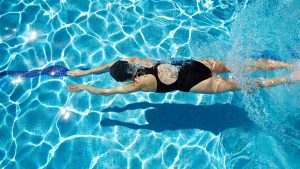
BY BRIDGET STEWART – PHYSIOTHERAPIST
As someone who used to be a swimmer and is now a swim coach it is no surprise to most people that I love being in around or on the water. Besides my general obsession with water it has so many great properties for healing and rehabilitation, and once people get over the fact that they have to get wet and sometimes cold it often has really good impacts on injury, regardless of what is injured! So here are 7 benefits of the water, and hopefully an encouragement to get in for a walk even if it isn’t your cup of tea.
- It doubles as both cardio and strength training – aqua jogging or walking and swimming both mean you are constantly moving, so your cardiovascular fitness is improved which should allow you to walk and move better on land. The resistance that the water gives also means that muscles are strengthened, as they are having to push through more to function. It is also said that having increased resistance around your lungs/ribcage can help to strengthen your respiratory muscles, making breathing less difficult on land.
- There is less impact – when in water you weight about 50% less than what you do on land. So, if you are struggling to put weight through any part of your leg or even your back, water can reduce a lot of the impact which we feel when walking. This is dependent on how deep water is but the more your body is in water, the lighter you are.
- More muscles get used – when sitting at a desk for most of the day we don’t tend to use our arms a lot, particularly not with overhead activity. We also tend to be sitting with our hips bent up. Luckily swimming or being in the water allows us to be extended through our hips and ensures that our arms are working more. Pulling yourself through the water will naturally mean your strength develops in your shoulder more compared to running. Core strength is also tested, ensuring that you are staying balanced in the water, especially when turning to breathe.
- Improving range of movement – due to the decreased weight and impact, we are able to work more on improving mobility into joints when we are in the water. Floats are really useful to help get things bending or straightening in a way which we may not be able to quite get on land. Getting the range of movement in the water will mean that you will develop strength to then be able to move better on land.
- Heat – I do understand not every pool is particularly warm, but if you are able to find or go to a pool specifically for hydrotherapy then the pool tends to be about 33 degrees! Warm water increases blood flow and circulation in order to reduce swelling or muscle inflammation which is particularly beneficial when you have an injury. The heat also helps you to relax, easing muscle tightness and helping to calm your body mentally and physically.
- Cross training – being that most people reading this probably aren’t swimmers, believe me when I say you will feel the benefit. So many athletes will do some form of swimming to help improve their strength, fitness and most importantly endurance. Being able to control and effectively use the air you breathe in will help to improve the oxygen use, and using muscles more effectively will help with running in any form
- Anyone can do it – whoever you are, you can get in the water and walk around, float, swim, dog paddle or anything! The most important thing is that you are present and doing something for your body, regardless of if you are injured or not!
If you have any questions about swimming, chat to your physio about it. If you have any questions about technique or specific things that you want to work on with your swimming then I am always happy to chat. The pool and water are my happy place, and something I never get sick of discussing.
 Bridget Stewart is a physiotherapist working out of our Johnsonvile clinic.
Bridget Stewart is a physiotherapist working out of our Johnsonvile clinic.
Want to see Bridget?
Why not book online now at: https://northcityphysio.co.nz/booknow
Or call us on 0800 627497











